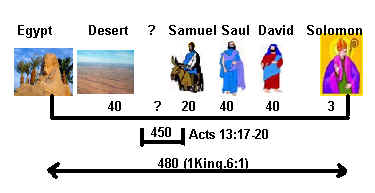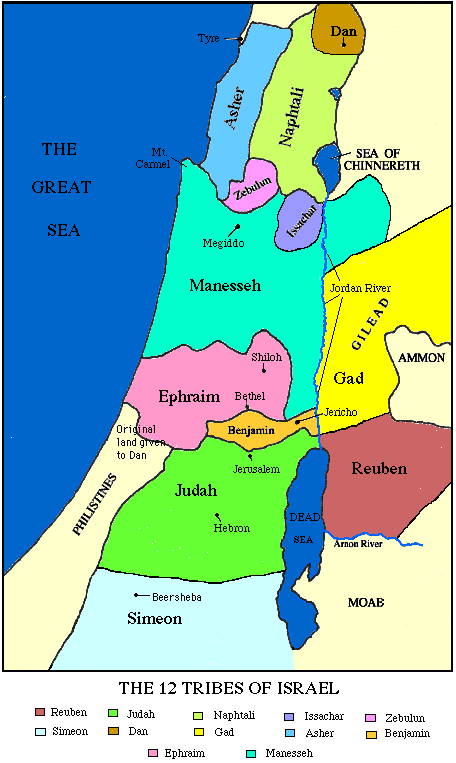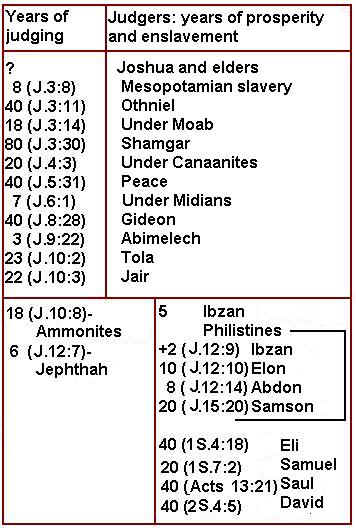|
Ellen
White - prophet?
Earth
after Second coming
The image, beasts of Daniel and "Revelation" Whore of
Babylon New
or Restored Jerusalem? The
Judgment Who
was Jesus before He came first time? Why
Sacrifices?
Seal of God and Mark of the Beast The
Book of Life What
happens when we die? |
40.
How many years from the Exodus out of Egypt to 4-th year of Solomon's reign?
In order to determine correctly, how old mankind is, it is necessary to answer also the given question. In 1King.6:1 it’s said: «And
it came to pass in the 480-th year after the children of Israel were come
out of the land of Egypt, in the fourth year of Solomon's reign over
Israel… he began to build the house of the LORD». It’s looks like in
the given phrase there is the answer to our question, however not everything is
so simple as it looks. In
Acts 13:17-20 Paul told: «The God of this people of
Israel chose our fathers, and exalted the people when they dwelt as strangers in
the land of Egypt, and with an high arm brought he them out of it. And about the
time of forty years suffered he their manners in the wilderness.
And when he had destroyed seven nations in the land of Chanaan, he divided
their land to them by lot. And after that he gave unto them judges
about 450
years, until Samuel
the prophet». Why in one place in the Bible it is spoken, that from the Exodus up to Solomon - 480 years, and in another verse it is spoken that from the leaving of the desert up to Samuel - 450 years, or, another words: from the Exodus (i.e. + 40 years in desert) up to Samuel - 490 years?
Let
see, why we have this problem? So, we know:
3)
Samuel became judge of Israel after the death of Eli, who was the judge of
Israel in that time (1Sam.4:18). Eli
died suddenly, when he heard the Arc of the Covenant was taken by Philistines. After the Arc had caused to
Philistines too many troubles and was returned, they tried to attack Israel
again, but Israelites prayed to God, and Philistines were defeated. After that
they did not attack Israel for 20 years (1Sam.7:2). All this time Samuel was the
judge of Israel, and neither Philistines, nor Amorites attack Israel any longer
(1Sam.7:13-14). By the end of these 20 years Samuel made his sons judges over
Israel (1Sam.8:1), and Amorites attacked Israel. At that time Israel people
asked for a king (1Sam.12:12). Thus, Samuel was the judge for 20 years, and
after these 20 years Saul was
elected as a king. Total: 20 years of government of Samuel 4) Saul reigned for 40 years (Act.13:21). 5) David reigned for 40 years (1King.2:11). 6) Until the 4-th year of Solomon's
government over Israel are 3 years of his reign. 40
years of the desert + about 450 of judges +20 of Samuel +40 of Saul +40 of David +3 of
Solomon= about 593 years. 1King.6:1 speaks, that from the Exodus until 4-th year of Solomon - 480 years, that is less than 593 years on (593-480 =) 113 years. Whence the such discrepancy?
The answers is: there in Egypt chronologists
had fixed only victories of pharaohs and never - their losses, and the Jews
following the Egyptian practice had fixed only years, when the land of Israel
was not in servitude. Following this point of view, let's assume, that both: Paul and an ancient chronicler of Israel’ history are right. The difference in their calculation consists only in that Paul gave us the length of the period of judges in real common Hebrew years and an ancient chronicler specified the same period without ranking years, when Israel was in bondage and disgrace. So, let us add up the total of the years until Solomon’s government, when Israel was under servitude: Total: 8 + 18 + 20 + 7 + 18 + 40 = 111 years, that is 2 years less than 113 years. There in Acts13:17-21 Paul used the word which
means «approximately, not exact». He told, that the time of government of the
judges was « about 450
years». Hence, as we have considered above, the both applications: the ancient chronicler’s in 1King.6:1 and Paul’s in Acts13:18-21 speak about the same time period. However it will be correct to take for a basis of calculation of the time from Exodus to 4-th Solomon’s year the application of the ancient historian. Therefore we need to add to the 480 years, the ancient historian told about, 111 years of slavery =. We will receive 591 years from the Exodus out of Egypt until 4-th year of Solomon. The
Bible also gives another confirmation that from the Exodus to the 4-th year of
Solomon - 591 years. It is the
application of Jephthah. It is interesting to notice the judge Jephthah counted years by the same method as the ancient chronicler did. When the king of the children of Ammon asked to return the cities which belonged to Amorites before (Judg.11:13), Jephthah told him: «While Israel dwelt in Heshbon … and in Aroer … and in all the cities that be along by the coasts of Arnon, 300 years? why therefore did ye not recover them within that time?» (Judg.11:26). Jephthah was the judge before Samuel that’s why we need to calculate time from leaving the desert, when people of Jephthah had received the land in their heritage, until Samuel’s time. So, from 591 years we need to subtract 40 years of wandering in the desert (because Israel got lands of Amorites right after coming out of desert), 3 years of Solomon, 40 years of David, 40 years of Saul and 20 years of Samuel (who were after Jephthah) we will have : 591-40-3-40-40-20 = 448 years from leaving the desert until Samuel. Now we need to find out how many years before Samuel Jephthah began to
rule, thus we will know exact number of years from leaving the desert until
Jephthah. For this purpose we need to study the time of Jair’s government, the
judge prior to Jephthah. As you remember, through the land of Israel river Jordan flows. On the East from Jordan there was land of the Reubenites, the Gadites, and the half tribe of Manasseh (Gilead). There Ammonites lived in the land of the Amorites. On the West of Jordan the other half of the Manasseh’s tribe and rest of tribes of Israel settled down. There the Philistines lived. When Bible speaks about Israel oppression by the Philistines and Ammonites, its delivery from hands of enemies due to the judges it’s talking about parallel events. We need to remember, usually the judges were elected only during a some threat to the national independence, for liberation of the people. And because Israel usually fell under a yoke of some one nation, the continuity of the judges was kept uniform, irrespective of, on the east or the west coast of Jordan the judge was elected. All depended on where a danger came from. When after Jair’s government Israel was attacked by both enemies: the Philistines and Ammonites, we can expect, that the judges were elected on the both coasts in the same time.
Thus, the above-stated verse speaks, that 18 years of Amorite oppression of Israel which lived on east coast of Jordan (Gilead) begun from the year when Jair died. After those 18 years of the oppression Jephthah the Gileadite became the judge. Under the Philistines there other judges were, who lived on the west coast of Jordan river. Ibzan from Judea ( Bethlehem) was judge for 7 years, Elon, Zebulonite, –10 years ; Abdon from the land of Ephraim –8 (Judg.12:8-15). After them Samson was the judge during 20 years (Judg.15:20). Samson put to the end Philistine government over Israel, when he killed «all the lords of the Philistines» (Judg.16:27). As the Philistines held Israel under their control for 40 years, and last 20 years Samson was the judge, it means, that their government began after 5 years Ibzan became the judge. After Samson Eli became the judge and ruled for 40 years, then - Samuel. All government of the judges looks as
follows:
So, now we can count how many years before Samuel Jephthah became the judge. For this purpose we need to count years from Jair up to Samuel in the right column (west bank of Jordan river) and subtract from them 18 years of Amorite oppression. (7+10+8+20+40) -18 = 67 years. It means, Jephthah became the judge on east bank 67 years prior to Samuel. Now let's use the method, which was used by all ancient chroniclers of the East, and let's count those years, when Israel was oppressed by some nation up to Jephthah: 8+18+20+7+18 (see above) = 71 years. It is less than 81 years for 10 years. Why we have this difference? Because even Manasseh already received the land of the Amorites in his heritage in the desert (Josh.12:1-6), he did not came to there until all Israel received all land (Josh.22:3,4,8). Within the first years Joshua completely defeated 7 peoples. Last fight was fight with the Anakims (Josh.11:21), it took place in 5-6 years after leaving of the desert, after Caleb asked Joshua to give him the land of the Anakims (Josh.14:6,7,10,12,13). After that « the land rested from war» (Josh.11:23). Though all the land already belonged to Israel in 5-6 years after the leaving of the desert, the fights in some places still had place (Josh.17:14-18), therefore, except for the tribe of Ephraim and half of the tribe of Manasseh nobody else came to their land. Joshua was angry on other 7 tribes, which for so long hadn’t settled down, and still didn’t «go to possess the land, which the LORD God of your fathers hath given you » (Josh.18:3). The land was given, but it was necessary to take it. After last 7 tribes and Levites had taken their land Joshua let the Reubenites, the Gadites, and the half tribe of Manasseh go to their land across Jordan. It took place in 10 years after the leaving of the desert. Hence, Jephthah , by using the method of chroniclers of the East, counted 300 years of habitation of Israel on the land of the Amorites, from the 10-th year after Israel left the desert, the year when the tribe of Manasseh returned to his own land. The
300 peaceful years specified by Jephthah
are equal (300+71 years of oppression) to 371 chronological years. Now we can
even calculate the time of the government of Joshua and his elders, who ruled
after his death. We
know, that during the Exodus Joshua was a lad, a young man (Ex. 33:11). As he was
estimated at the first census (Num.26:64,65), he was 20 years old or a little
older
(Num.14:29,30)..
He probably was about 25. After 40 years in the desert he was about 65, he died
in the age of 110 (Josh.24:29). And that means, Joshua ruled about 45 years.
To
learn how long Joshua’s period was as well as the period of the elders after
him, we need to count all time of judges (including
the years of slavery), specified in the Bible, and we need to subtract it from
448 years (from leaving the desert up to Samuel), which had mentioned above. So,
8+40+18+80+20+40+7+40+3+23+22+18+67 years
from
Jephthah
to
Samuel
= 396 years.
Now from the 448
years we need subtract 396 = 52 years. Out of them about 45 years Joshua ruled,
and thus other 7 years the elders after Joshua ruled.
Now
we can say for sure, that from coming out of desert until
Samuel
- 448 biblical years.
|


